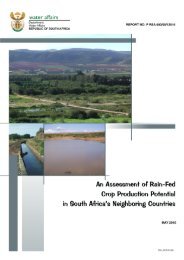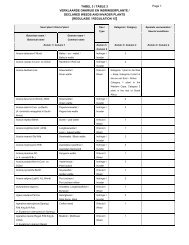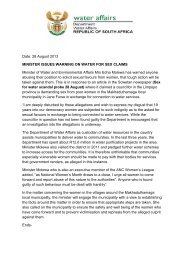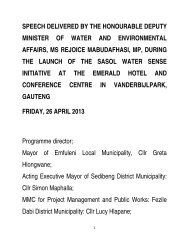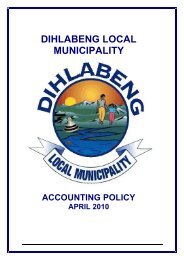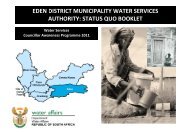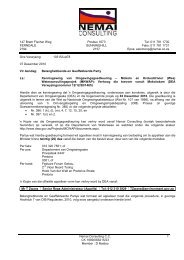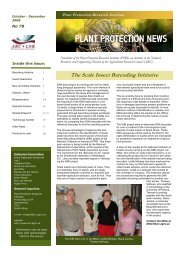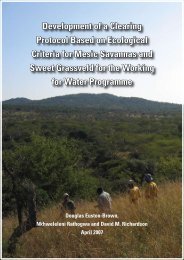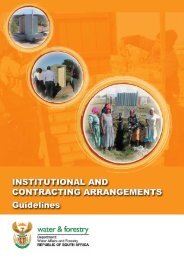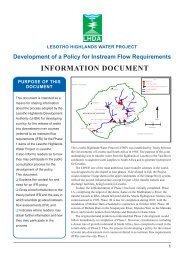Business Case forthe Pongola-Umzimkulu Catchment Management ...
Business Case forthe Pongola-Umzimkulu Catchment Management ...
Business Case forthe Pongola-Umzimkulu Catchment Management ...
Create successful ePaper yourself
Turn your PDF publications into a flip-book with our unique Google optimized e-Paper software.
<strong>Business</strong> <strong>Case</strong> for the <strong>Pongola</strong>-<strong>Umzimkulu</strong> <strong>Catchment</strong> <strong>Management</strong> Agency<br />
(i) Water Use Authorisation and Licensing<br />
Water use authorisation and licensing are continued from phase 1, at which stage the CMA<br />
would have been involved with processing applications and advising DWA on issues related<br />
to license applications, and phase 2 where general authorisations and limited licensing<br />
powers were delegated to the CMA.<br />
During the final phase, the CMA will be delegated the power to authorise water use and<br />
issue licenses. These functions will be delegated to the CMA for non-strategic water use, as<br />
authorising strategic water uses will remain a function of DWA.<br />
(ii) Compulsory Licensing<br />
In areas with water stress (demand exceeds availability) or inequitable access to water<br />
resources, compulsory licensing is undertaken to assess the volume and quality of water<br />
available and allocating that available resource in an equitable and sustainable way. In<br />
phase 3, the CMA will be delegated the power to undertake compulsory licensing.<br />
(iii) Issuing of Directives 13<br />
As the responsible authority, the CMA should be delegated the power to issue directives<br />
(over and above the inherent powers in this regard conferred by the NWA). The directives<br />
could include, but will not be limited to:<br />
• Requesting alterations to waterworks<br />
• Determining operating rules for systems<br />
• Controlling, limiting, and prohibiting water use.<br />
6.5 Considerations for the delegation process<br />
Both the Governing Board of a CMAand the Minister will have its own view of what<br />
functions should be delegated to the CMA at what point in time, and these outline offered<br />
above should be seen as a guideline only, not a prescriptive list.<br />
The rate and order of the powers and functions to be delegated may be influenced by:<br />
• Water resources management priorities of the CMA as outlined in the CMS<br />
• Functions in the WMA that are not performed adequately by the regional office<br />
• The ability of DWA to reconfigure current information systems in order to accommodate<br />
the WMA geographical demarcation<br />
• WRM initiatives of other institutions<br />
• Whether the CMA has adequate capacity and resources to perform the proposed<br />
functions, or has a clear plan to address possible capacity limitations<br />
• Whether the regional office staff are available for secondment and/or transfer as a<br />
critical mass with the functions, and the implications for the remaining functions<br />
performed by DWA and<br />
• The status of support functions such as finance and corporate services within the CMA.<br />
13 Refer to Appendix 1 for additional information<br />
Department of Water Affairs 29



